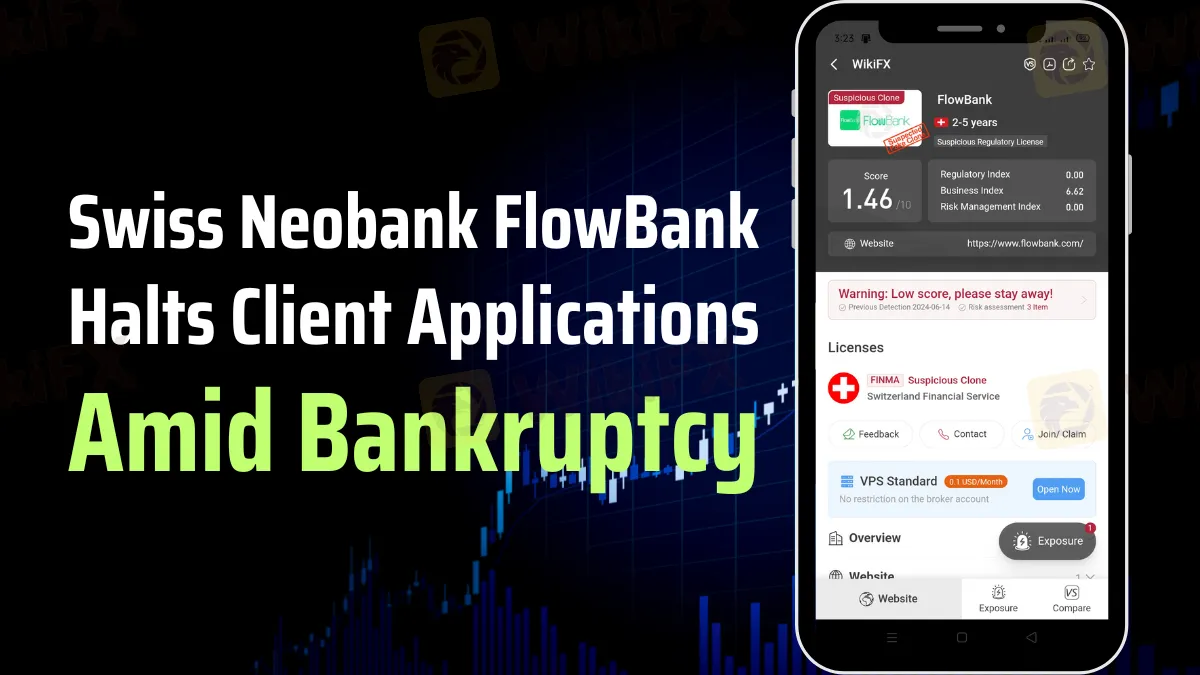简体中文
繁體中文
English
Pусский
日本語
ภาษาไทย
Tiếng Việt
Bahasa Indonesia
Español
हिन्दी
Filippiiniläinen
Français
Deutsch
Português
Türkçe
한국어
العربية
Swiss Neobank FlowBank Halts Client Applications Amid Bankruptcy
Abstract:Swiss neobank FlowBank stops new client applications and onboarding as financial regulator FINMA initiates bankruptcy proceedings.

FlowBank, a Swiss online neobank, unexpectedly ceased accepting new customer applications and stopped providing client onboarding. This comes following the announcement earlier today that the bank will be filing for bankruptcy by the Swiss financial authority, FINMA.
While FlowBank's primary website is still up and running, a maintenance notice has been added to the “Open an Account” page informing users that the onboarding procedure is now not accessible. Customers who need help opening an account can get in touch with customer support.

CEO Charles-Henri Sabet founded FlowBank in 2020, with an initial emphasis on banking and investing operations. It has, however, just changed its emphasis to online CFD trading, which was akin to Sabet's prior business endeavor, London Capital Group Ltd (LCG). The cryptocurrency investment firm CoinShares owns a sizeable 30% of FlowBank's ownership.
Concerns about FlowBank's financial stability led FINMA to decide to file the bank for bankruptcy. The regulator disclosed that FlowBank may be overindebted and no longer satisfies the minimal capital criteria required for its operations. With preliminary estimates showing that FlowBank's “privileged deposits” may be completely reimbursed from the bank's available cash, this step seeks to safeguard depositors.

It's still unclear how FlowBank's insolvency would affect LCG, a subsidiary. Despite not having submitted its 2022 financial accounts—which are late by over six months—LCG is purportedly in good standing and has a separate license from the UK's Financial Conduct Authority (FCA).
The group also comprises LCG Capital Markets Limited, an offshore company based in the Bahamas, and London Capital Group (Cyprus) Ltd, a company whose CySEC license was revoked in 2021.
The demise of FlowBank is the second big blow to neobrokers in Europe in less than a year. Due to ongoing losses, Amsterdam-based BUX was sold to ABN Amro in the latter part of last year. The demise of FlowBank highlights the financial risks that may occur in the quickly changing digital banking ecosystem and adds to the expanding list of issues affecting the neobank industry.
Stakeholders and customers are waiting for more information as it develops on FlowBank's bankruptcy procedures and the implications for the neobanking sector as a whole.
You may also access the latest news in the financial market here.

Disclaimer:
The views in this article only represent the author's personal views, and do not constitute investment advice on this platform. This platform does not guarantee the accuracy, completeness and timeliness of the information in the article, and will not be liable for any loss caused by the use of or reliance on the information in the article.
Read more

PayPal Expands PYUSD Transfers to Ethereum and Solana
PayPal's PYUSD stablecoin can now transfer across Ethereum and Solana, enhancing flexibility for users through a LayerZero cross-chain integration.

Broker Review: Is Exnova Legit?
A forex broker named Exnova has recently come to our attention. This broker is registered in Saint Vincent and the Grenadines and started its business in 2021. In this article, we will dig into this broker deeply and provide some information if you are interested.

Robinhood Reinstates SOL and ADA Amid Expanding Crypto Offerings
Robinhood brings back SOL and ADA for U.S. investors after delisting due to SEC concerns, adding XRP and PEPE in an expanded lineup of 19 cryptocurrencies.

Capital.com Shifts to Regional Leadership as CEO Kypros Zoumidou Steps Down
Capital.com transitions to a regional leadership model as Kypros Zoumidou steps down, promoting Christoforos Soutzis as CEO of its Cyprus operations.
WikiFX Broker
Latest News
JUST Finance and UBX Launch Multi-Currency Stablecoin Exchange
XM Revamps Website with Sleek Design and App Focus
TradingView & Mexico’s Uni. Partnership, to Enhance Financial Education
Something You Need to Know About SogoTrade
Global Shift in Cryptocurrency Taxation: Italy and Denmark Chart New Paths
Webull Introduces 24/5 Overnight Trading to Extend U.S. Market Access
eToro Launches Global-Edge Smart Portfolio: A Balanced Approach to Growth and Stability
Darwinex advises traders to update MT4 & 5
Revolut X Expands Crypto Exchange Across Europe, Targeting Pro Traders
Crypto Scammer Pleads Guilty in $73 Million “Pig Butchering” Fraud
Currency Calculator


